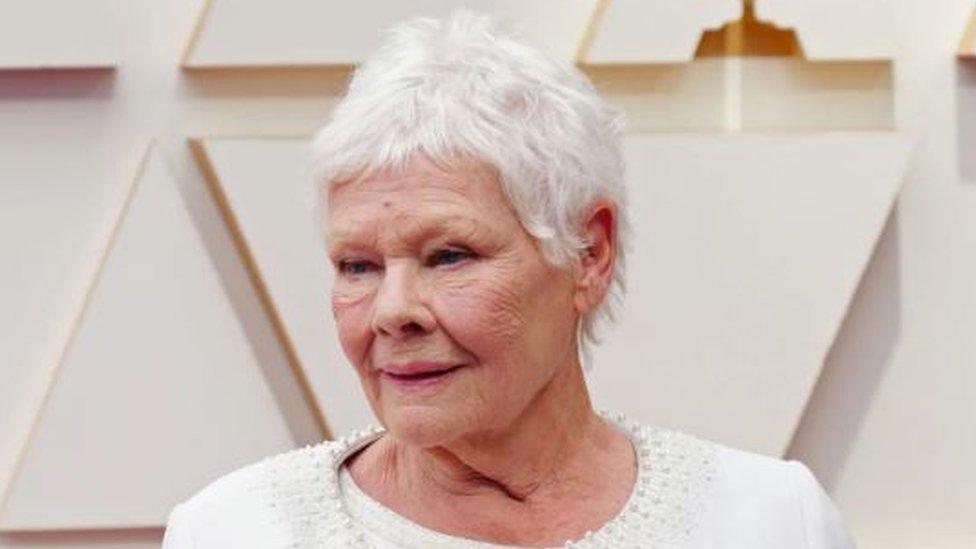Local elections 2023: Will York's 'blue badge ban' help Labour turn city red?
- Published
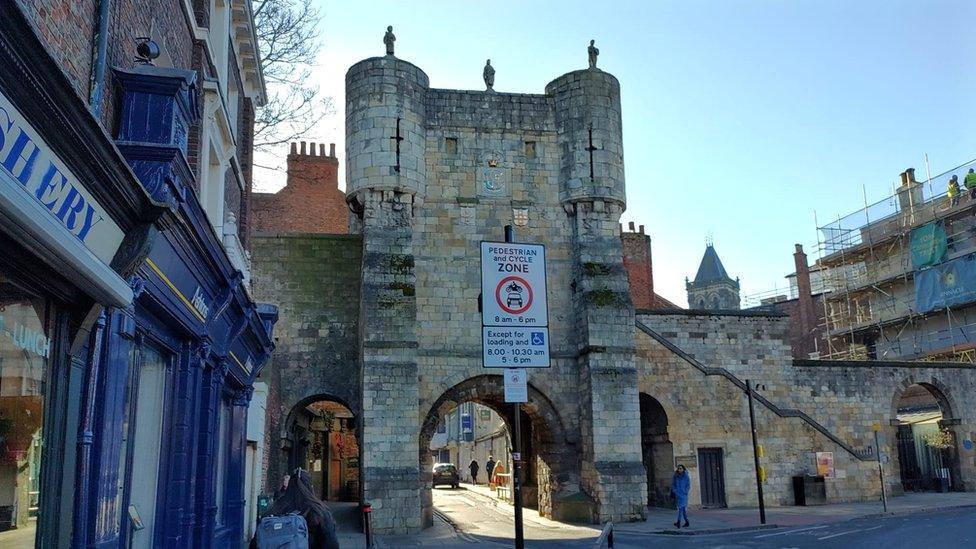
City of York Council said counter-terrorism measures were installed on the advice of police to mitigate against the threat of a vehicle attack
With every seat on York City Council up for grabs in 4 May's election, Labour are hoping an outcry over blue badge parking restrictions - which have drawn ire from disability campaigners, government ministers and even Dame Judi Dench - will help them oust the Lib Dem-Green coalition.
For Jane Burton, next week's election is personal.
The 63-year-old disability activist is a long-time Labour member but says she had never before considered standing as a candidate for the party. Then came York's restrictions on blue badge parking.
Ms Burton, co-founder of the York Accessibility Action group, has led campaigning against the removal of the right of people with disabilities to park vehicles in pedestrianised areas of the historic city centre - a hugely contentious issue which looms large over the vote on 4 May.
"I got really energised and involved off the top of that," said Ms Burton, who is running for Labour in Micklegate ward.
The "blue badge ban" - as its opponents call it - was first introduced by the council to allow social distancing on York's narrow "footstreets" during the Covid pandemic, before it was made permanent by the local Liberal Democrat-Green coalition in 2021.


The council said it was acting on the guidance of police to mitigate against the threat of a vehicle terror attack in York, a tourist hotspot which attracts more than 8 million visitors a year.
Nigel Ayre, the council's Lib Dem leader, said counter-terrorism officers had given "really strong advice" that allowing blue badge parking "would be seen as an opportunity by terrorists".
"Ultimately, the duty to protect life is a really heavy burden," he added.
But many blue badge holders, including Ms Burton, feel they have been pushed out of the city centre. "People are just aghast at what has happened," said the Labour candidate. "It is pure and simple discrimination.
"I've been excluded from going to the opticians, all the local shops, the City Screen cinema."
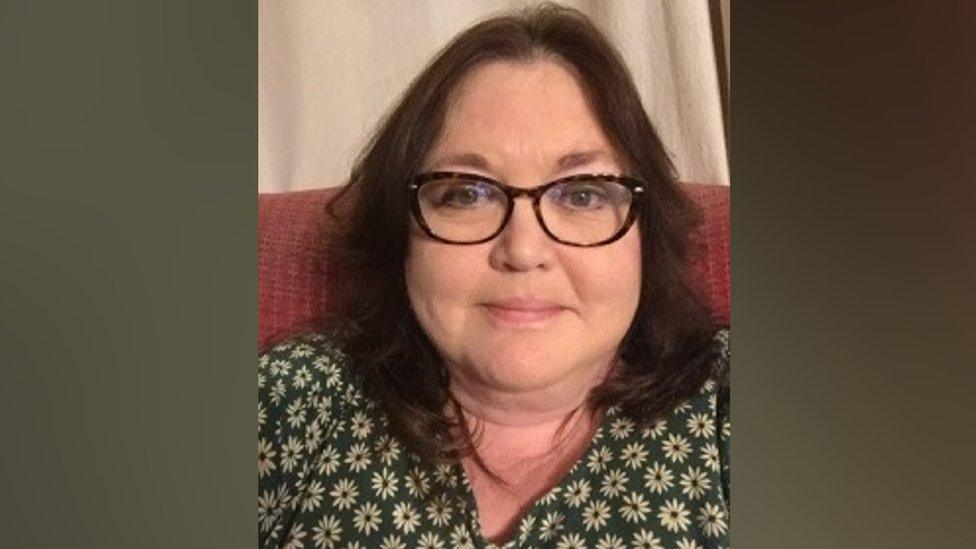
Jane Burton said she felt discriminated against by blue badge parking restrictions
Labour have made reinstating blue badge parking a key pledge of their campaign in York, where winning a handful of seats could see them overtake the Lib Dems as the council's largest party or even seize full control. The city-centre ward of Micklegate, where Labour already have two councillors but lost out on a third to the Greens by 208 votes in 2019, is one area where they hope to make gains.
York's Conservatives, who have two seats on the council after losing eight on a disastrous election night four years ago, have also vowed to lift the blue badge restrictions. Paul Doughty, the leader of the Tory group, said the measures were "disproportionate" and expensive.
Even the Greens, who voted through the policy, have called for a review to establish whether some of the city centre's vehicle access routes could be opened up to disabled people.
Andreas Heinemeyer, a Green candidate in Micklegate, said plans to install remotely controlled barriers offered a "clear opportunity to look at this again and to develop access routes which will work for blue badge holders but not compromise security".
'Massive issue'
Disability campaigners have even won support in Westminster and Hollywood.
Government minister Lee Rowley, in a parliamentary debate this week called by York Central's Labour MP, Rachael Maskell, urged the council to consider if it was "unduly imposing on the rights and freedoms of disabled residents".
York-born actor Dame Judi Dench, meanwhile, last month gave her "wholehearted" backing to calls for the city centre to be "fully accessible" to blue badge holders.
There is evidence to suggest the Lib Dems, who themselves need only three more seats to secure full control of the council, should be worried the issue could cost them votes.
A number of people who the BBC spoke to in York city centre raised the subject of blue badge parking unprompted. None voiced support for the restrictions.
"It just makes the centre totally inaccessible for people," said Martin Ledger, 57, of Bishopthorpe, who said he had no party allegiance but considered the issue a "vote-swinger".
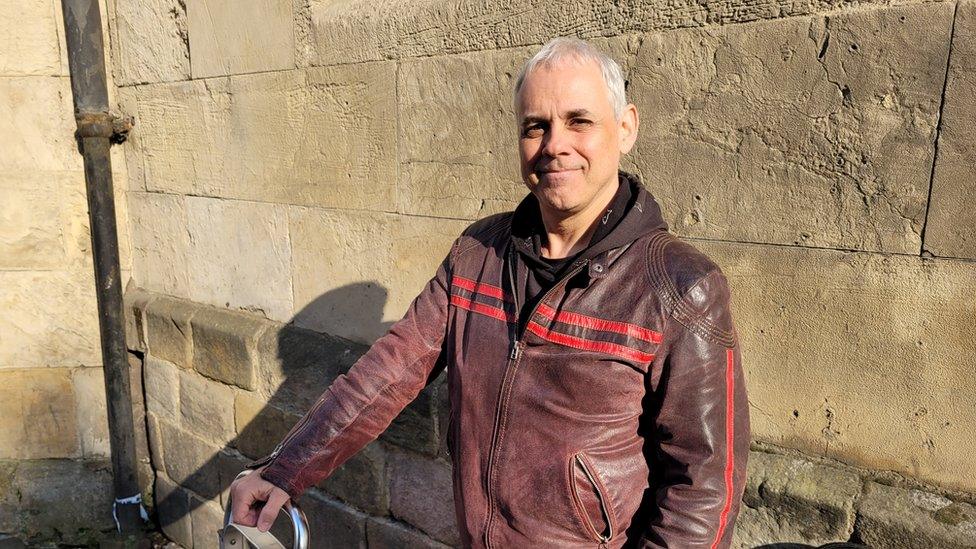
Martin Ledger said the blue badge row could be a "vote-swinger" for him
"I do think there ought to be anti-terrorist measures," said the busker, packing up his guitar and amp at the end of a day playing in High Ousegate. "But I think it needs to be given more thought. These are people who ought to be aided, not hindered.
"I don't think it's the right solution, I think it was a solution that was reached in haste."
Connor Mayhew, 26, who lives in South Bank, in the centre of Micklegate ward, said he did not usually take much interest in politics but thought the blue badge restrictions were "shocking" and could compel him to vote.
He said: "My mum is visually impaired and she was devastated. She used to come into town a lot but she doesn't much any more. She's really upset.
"It's a massive issue locally."
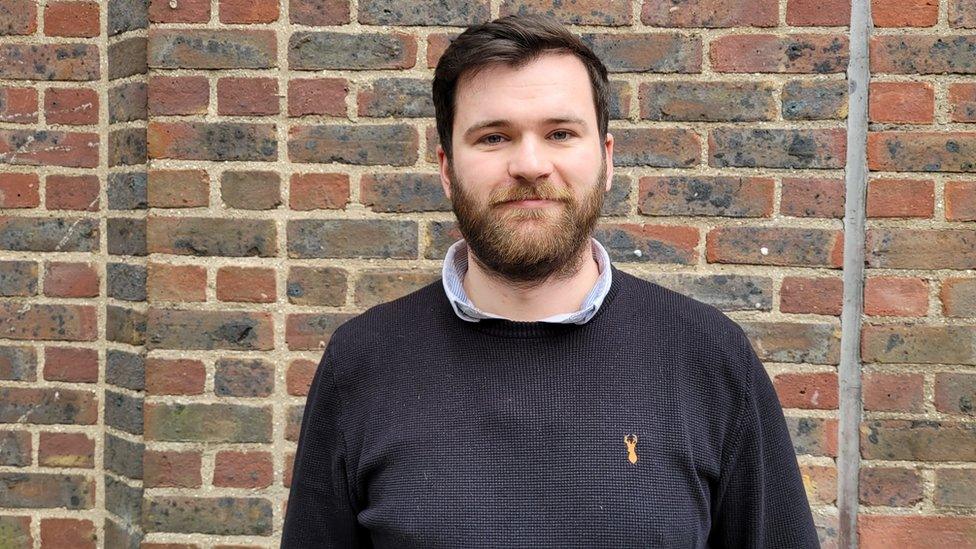
Connor Mayhew said his visually impaired mother was "devastated" she could not park in the city centre
First-time voter Katy Roughton, who works on a city-centre flower stall, said she felt the blue badge restrictions were "very discriminatory" and had led to the number of disabled people in the area "dwindling".
The 21-year-old said she "probably" would have voted Labour anyway on 4 May but the strength of her feeling about her issue had reinforced her support.
"They seem like the only party at the moment that are trying to reverse the ban," she said.
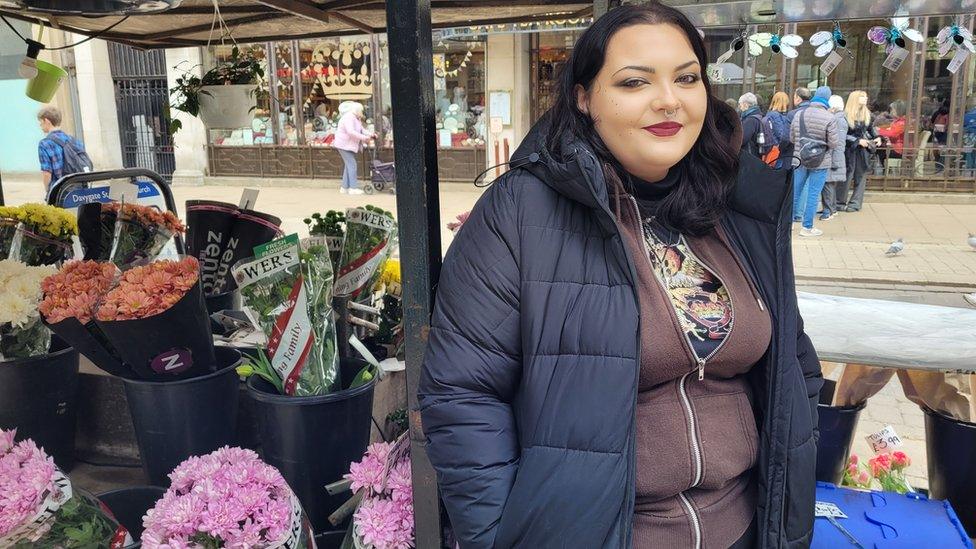
Katy Roughton said she would be voting for Labour on 4 May
The extent to which the average voter will be swayed by the blue badge row remains to be seen, however. Other issues - both local and national - are at play, even for those who oppose the anti-terror measures.
"Pot holes and roads," said Stuart Billingham, 70, who lives the village of Dunnington, when asked what local issues he felt were important. "It sounds so parochial, doesn't it? But they are really bad. I travel by bus into York, mainly, and I'm surprised the buses are still running, the potholes are so bad and the buses' suspension is so poor."
Mr Billingham, a retired university professor, believes the blue badge restrictions have been badly handled by the council. But he is still planning to vote Lib Dem, despite traditionally backing Labour and even once standing as a candidate for the party - "a long time ago" - in a council election in Bedford.
"I'm kind of disgruntled with the Labour Party, I don't think it's trying to do the kind of things I would associate with the Labour Party," he said. "I think Keir Starmer is a very weak leader."
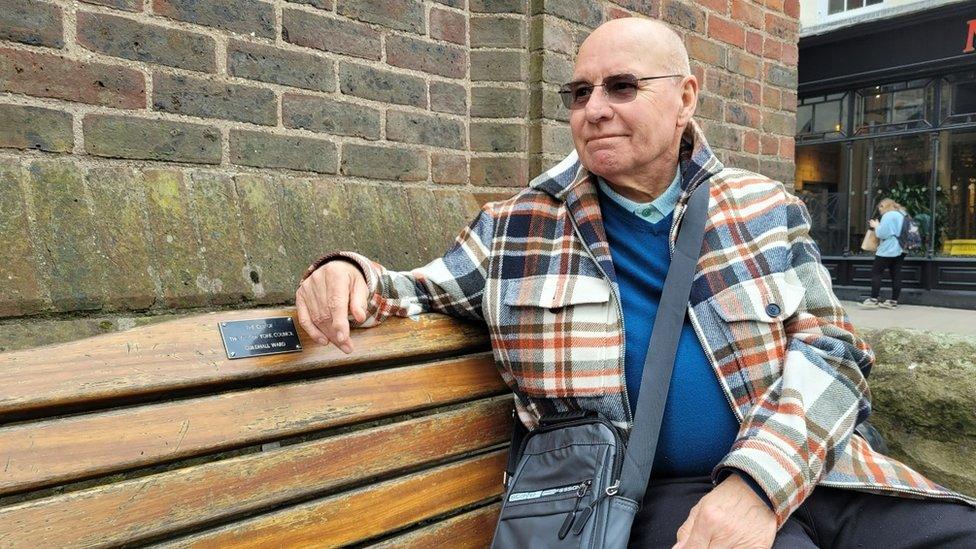
Stuart Billingham has grown disillusioned with the national Labour Party
Pauline Fitzgerald, 62, who lives in the suburb of Dringhouses, said she liked what the Lib Dems had proposed.
"They seem to be doing a lot in our area. We're cyclists and they're trying to repair the roads and the pot holes," she said, adding that the council had also stepped in to save threatened bus routes.
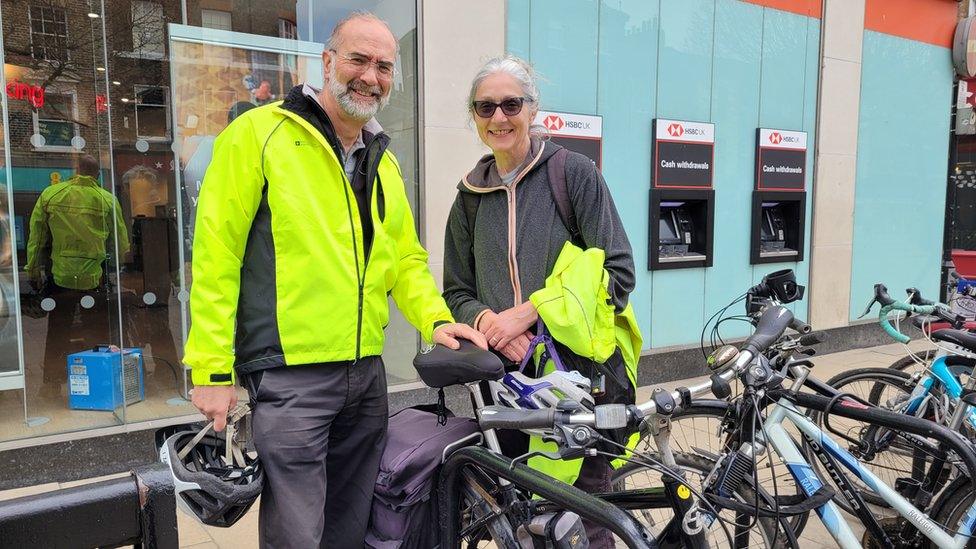
Pauline Fitzgerald, right, is in favour of the Lib Dem proposals
But Ms Fitzgerald said she also admired the Green Party and would be happy with another coalition.
And it is York's Greens who could once again prove to be kingmakers, whoever wins the tussle to be the council's biggest party.
The party won four seats in 2019, but has set its sights on doubling that on 4 May.
See a full list of the candidates standing in Micklegate here, external.

Follow BBC Yorkshire on Facebook, external, Twitter, external and Instagram, external. Send your story ideas to yorkslincs.news@bbc.co.uk, external.
Related topics
- Published3 May 2023

- Published27 April 2023

- Published9 March 2023
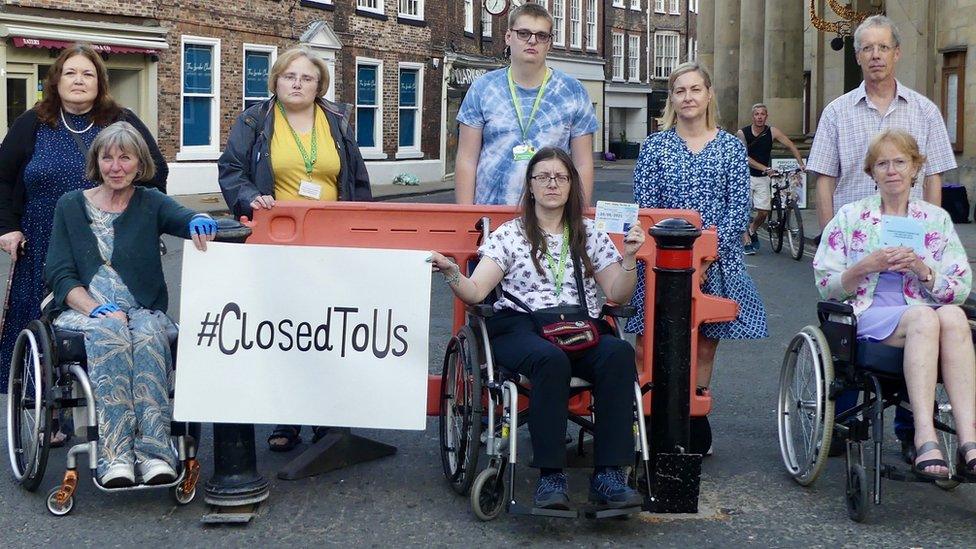
- Published7 March 2023
